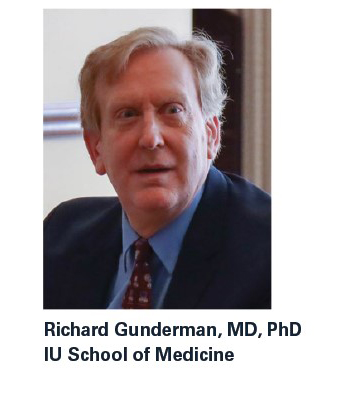By: Richard Gunderman, MD, PhD
IU School of Medicine

When will we physicians learn that to become our best at caring for patients, we cannot confine our attention to what we learn in medical school, residency and fellowship, and continuing medical education? To a substantial degree, the boundaries of our excellence are set by the perspectives and ideas we work and live with, and one of the best ways to deepen our perspectives and enhance our ideas is to read well. We all first learned to read in the first decade of life, but reading better and better should be a life-long calling.
Some physicians might react to such a suggestion with disbelief. “I am already drowning in my busy clinical practice, I hardly have time for my family and friends, and I can barely keep up with new developments in my field of medicine, and now you expect me to spend time reading outside of work? What are you, crazy?” The answer, of course, is yes. Medicine needs not less craziness but more, so long as we are crazy for the right things, such as nurturing our imaginations, deepening our hearts, and enriching our characters.
Those who lack time to read well lack the resources necessary to work and live well, and who can afford to skimp on the latter? Which leads naturally to the question: what is most worth reading? Suppose a physician can spend only a few hours per week with a good book. With hundreds of books being published every day, it becomes crucial to choose well. For this purpose, we can divide books into three categories according to their difficulty and depth: undergraduate, graduate, and postgraduate levels.
Among strong undergraduate contenders are non-fiction works such as Oliver Sacks' “The Man Who Mistook His Wife for a Hat,” which explores human nature through neurologic disorders; Siddhartha Mukherjee’s “The Emperor of All Maladies,” which tells the history of cancer; and Anne Fadiman’s “The Spirit Catches You and You Fall Down,” which explores the role of culture in healthcare. A fiction choice is Abraham Verghese’s “Cutting for Stone,” which contains a surprising number of medical pearls.
Graduate contenders include great short works of fiction by physicians, such as Mikhail Bulgakov’s “A Country Doctor’s Notebook,” which reports the exploits of a newly minted physician in the rural Soviet Union; William Carlos Williams’ “The Doctor Stories,” which explores the relationship between personality and character in medical excellence; and Anton Chekhov’s “Chekhov’s Doctors,” which by plumbing the depths of isolation, misery, and missed opportunities casts medicine’s bright side in sharp relief.
The postgraduate course, among the most difficult yet illuminating works of all, includes The Bible, especially the books of Genesis, Job, and Luke, which open our eyes to the mystery and wonder of life, death and suffering; Homer’s “Iliad,” perhaps the most profound study of mortality ever composed; Swift’s “Gulliver’s Travels,” which serves to recalibrate the compass of human nature; and Tolstoy’s “Anna Karenina,” which reveals the true loci of despair and joy in human life.
Of course, it is not enough to purchase, own, or even run our eyes over every line of such works. We must also genuinely read them, and this, just like a physical fitness program, requires dedication and discipline. As we read, we should pause from time to time to ask ourselves questions or take notes. The second US President John Adams was a great reader, whose marginalia sometimes exceeded the number of words in the text he was reading. Reading well is an active, not passive, activity.
We must also read generously. This means avoiding the temptation to suppose that there is something wrong with the text and instead recognizing that the fault may lie with us. Before we ask whether we like or agree with what we are reading, we need to ask some preliminary questions. What is the work saying about our work and life – in other words, what does it mean? What would it mean for us if what it is saying were true – how might it transform us? And then and only then, do we find its vision persuasive, and why?
Finally, we must recognize that reading is not meant to be a solitary activity. To read well, we need to discuss what we are reading with others – colleagues, family, or friends. When we think about resources for medicine, we usually think of facilities, equipment, and personnel, but a key resource is a reading partner or book group. One of the surest ways of enhancing the fulfillment of physicians in work and life would be to engage us in thriving reading and discussion groups.
To repeat, those who have no time to read well lack the time to work and live well. We can only do and be as well as the perspectives and ideas we go through life with, and by enriching these we enhance not only our own experience but the lives of those we work with and serve. It is not an exaggeration to say that reading well brings us to life and enhances our capacity to bring life to others. The out-of-pocket cost may be next to nothing, but the rewards are just about incalculable.
Richard Gunderman, MD, PhD, is the chair of the ISMA Wellness Steering Committee.